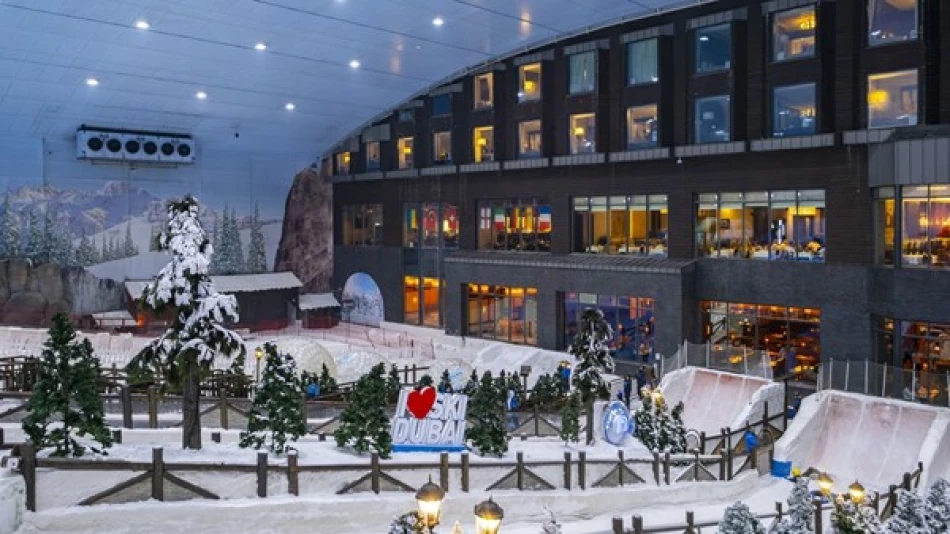
Immerse Yourself in Dubai's Thrilling Indoor Attractions: A Family Adventure Wonderland
Dubai Doubles Down on Indoor Entertainment Empire to Combat Summer Heat
Dubai is leveraging its world-class indoor entertainment infrastructure to position itself as the premier family destination during the scorching summer months. The emirate's ambitious #Dubai_Destinations summer 2025 campaign showcases how strategic investment in climate-controlled attractions has created a recession-proof tourism model that thrives when outdoor activities become impossible.
The Climate-Proof Tourism Strategy
While most Middle Eastern destinations see tourism plummet during summer when temperatures soar above 45°C (113°F), Dubai has engineered the opposite effect. The city's collection of indoor entertainment venues represents a calculated bet on year-round tourism revenue, transforming what was once considered the "dead season" into a profitable family-focused period.
This approach mirrors Singapore's success with attractions like Gardens by the Bay, but Dubai has scaled the concept to unprecedented levels, creating entire ecosystems of indoor entertainment that can accommodate tens of thousands of visitors daily.
Flagship Attractions Leading the Charge
Ski Dubai: Desert Snow as a Differentiator
At the Mall of the Emirates, Ski Dubai remains the crown jewel of this strategy. The Middle East's first indoor ski resort features slopes extending over 1,300 feet—among the world's longest indoor ski runs. Beyond skiing, the venue includes a snow park, summer camps for children, and penguin encounters, creating multiple revenue streams from a single facility.
The attraction serves as both a tourist magnet and a powerful marketing tool, generating social media buzz that traditional theme parks cannot match.
Educational Entertainment: The KidZania Model
KidZania at Dubai Mall represents the growing trend of "edutainment"—combining education with entertainment. The miniature city allows children aged 2-16 to experience over 40 real-world professions, tapping into parents' desire for meaningful experiences that justify premium pricing.
This concept, which originated in Mexico, has found particular success in Dubai's multicultural environment, where expatriate families seek activities that provide both entertainment and developmental value.
Scale and Ambition: Breaking Global Records
IMG Worlds of Adventure exemplifies Dubai's "go big or go home" philosophy. As one of the world's largest indoor theme parks, spanning over 1.5 million square feet in City of Arabia, it can accommodate more than 20,000 visitors daily. The venue houses six themed worlds under one roof, creating an all-day destination that competes directly with outdoor theme parks in more temperate climates.
Dubai Parks and Resorts further demonstrates this scale, combining theme parks, cinema, and sports facilities in a single entertainment complex—a model that maximizes visitor spending and time on-site.
The Nature Experience Indoors
Dubai has also mastered the art of bringing nature indoors. The Green Planet recreates a tropical rainforest environment, housing over 3,000 species of plants and animals. This 4-story biodome offers camping experiences and animal interactions, proving that even nature-based tourism can thrive in climate-controlled environments.
Similarly, Dubai Aquarium and Underwater Zoo at Dubai Mall features one of the world's largest suspended aquariums, with over 140 fish species and a transparent tunnel that creates Instagram-worthy moments for visitors.
Market Impact and Investment Returns
This indoor entertainment strategy represents billions of dollars in infrastructure investment, but the returns are substantial. Unlike seasonal outdoor attractions, these venues generate consistent revenue year-round, with summer months often proving more profitable due to increased family travel during school holidays.
For real estate developers, these attractions serve as anchor tenants that drive foot traffic to shopping malls, creating symbiotic relationships between retail and entertainment sectors.
Competitive Positioning in Global Tourism
Dubai's indoor entertainment ecosystem positions it uniquely against traditional family destinations. While Orlando relies on favorable weather for much of its appeal, and European destinations face seasonal limitations, Dubai offers consistency regardless of external conditions.
This reliability factor has become increasingly valuable as climate change makes weather patterns less predictable globally. Destinations that can guarantee comfortable conditions year-round hold a significant competitive advantage.
The Future of Climate-Adapted Tourism
Dubai's success with indoor entertainment is likely to influence tourism development across the Gulf region and other hot climate destinations. The model proves that extreme weather can be transformed from a liability into a competitive advantage through strategic infrastructure investment.
As global temperatures continue rising, Dubai's climate-controlled tourism model may well represent the future of destination development in challenging environments. The emirate has essentially created a blueprint for thriving tourism industries in locations previously considered unsuitable for year-round visitation.
Most Viewed News

 Layla Al Mansoori
Layla Al Mansoori






